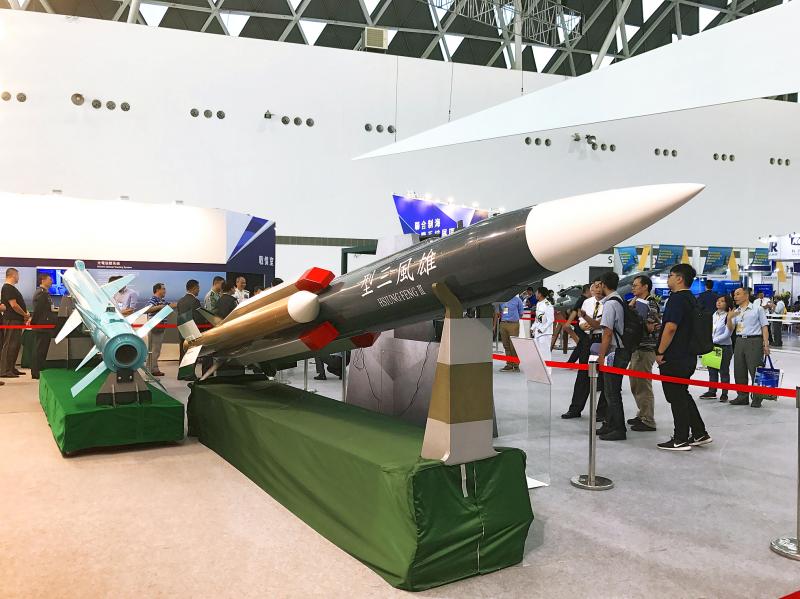The Executive Yuan on Friday revealed the schedule for Taiwan’s indigenous missile and warship production.
The schedule is part of a draft bill on the nation’s sea and air combat power enhancement program that the Cabinet submitted to the legislature.
The NT$240 billion (US$8.65 billion) program, to be implemented from next year to 2026, would also include the acquisition of long-range cruise missiles, upgraded air defense systems and modern warships.

Photo: Hung Chen-hung, Taipei Times
The indigenous Wan Chien air-launched cruise missile with a claimed range of 200km would be produced from next year to 2024, while the Hsiung Sheng cruise missile would be produced from next year to 2025, the bill said.
The Chien Hsiang loitering munition, which has entered mass production, would be produced under the program from next year to 2025, it said.
A long-range variant of the Hsiung Feng III supersonic anti-ship and land-attack missile, which has a claimed effective range of 400km, would be produced from 2023 to 2026, it said.
The Hsiung Feng I and Hsiung Feng II missiles’ coastal defense variants and their dedicated road-based mobile launch vehicles would be produced from next year to 2026, the bill said.
The Hsiung Feng III missile would be produced from 2023 to 2026, it said.
As for naval equipment, two phases of production of Tuo Jiang-class corvettes are planned, it said.
Phase 1 would start next year and phase 2 would start in 2023, while both phases would conclude in 2026, it said.
The Coast Guard Administration’s Anping-class patrol vessels would be retrofitted with missiles, and command and control facilities between 2023 and 2026, it said.
Procurements of the surface-to-air variant of the Tien Chien II missile and the Tien Kung III missile defense system would be integrated in the program, with production from next year to 2026. it said.
The state-owned Chungshan Institute of Science and Technology, which designed most of the program’s equipment and oversees the nation’s missile production, said in a report that it expects revenue to increase 50 percent to an unprecedented NT$95.39 billion next year.

The manufacture of the remaining 28 M1A2T Abrams tanks Taiwan purchased from the US has recently been completed, and they are expected to be delivered within the next one to two months, a source said yesterday. The Ministry of National Defense is arranging cargo ships to transport the tanks to Taiwan as soon as possible, said the source, who is familiar with the matter. The estimated arrival time ranges from late this month to early next month, the source said. The 28 Abrams tanks make up the third and final batch of a total of 108 tanks, valued at about NT$40.5 billion

Two Taiwanese prosecutors were questioned by Chinese security personnel at their hotel during a trip to China’s Henan Province this month, the Mainland Affairs Council (MAC) said yesterday. The officers had personal information on the prosecutors, including “when they were assigned to their posts, their work locations and job titles,” MAC Deputy Minister and spokesman Liang Wen-chieh (梁文傑) said. On top of asking about their agencies and positions, the officers also questioned the prosecutors about the Cross-Strait Joint Crime-Fighting and Judicial Mutual Assistance Agreement, a pact that serves as the framework for Taiwan-China cooperation on combating crime and providing judicial assistance, Liang

A group from the Taiwanese Designers in Australia association yesterday represented Taiwan at the Midsumma Pride March in Melbourne. The march, held in the St. Kilda suburb, is the city’s largest LGBTQIA+ parade and the flagship event of the annual Midsumma Festival. It attracted more than 45,000 spectators who supported the 400 groups and 10,000 marchers that participated this year, the association said. Taiwanese Designers said they organized a team to march for Taiwan this year, joining politicians, government agencies, professionals and community organizations in showing support for LGBTQIA+ people and diverse communities. As the first country in Asia to legalize same-sex

MOTIVES QUESTIONED The PLA considers Xi’s policies toward Taiwan to be driven by personal considerations rather than military assessment, the Epoch Times reports Chinese President Xi Jinping’s (習近平) latest purge of the Chinese People’s Liberation Army (PLA) leadership might have been prompted by the military’s opposition to plans of invading Taiwan, the Epoch Times said. The Chinese military opposes waging war against Taiwan by a large consensus, putting it at odds with Xi’s vision, the Falun Gong-affiliated daily said in a report on Thursday, citing anonymous sources with insight into the PLA’s inner workings. The opposition is not the opinion of a few generals, but a widely shared view among the PLA cadre, the Epoch Times cited them as saying. “Chinese forces know full well that